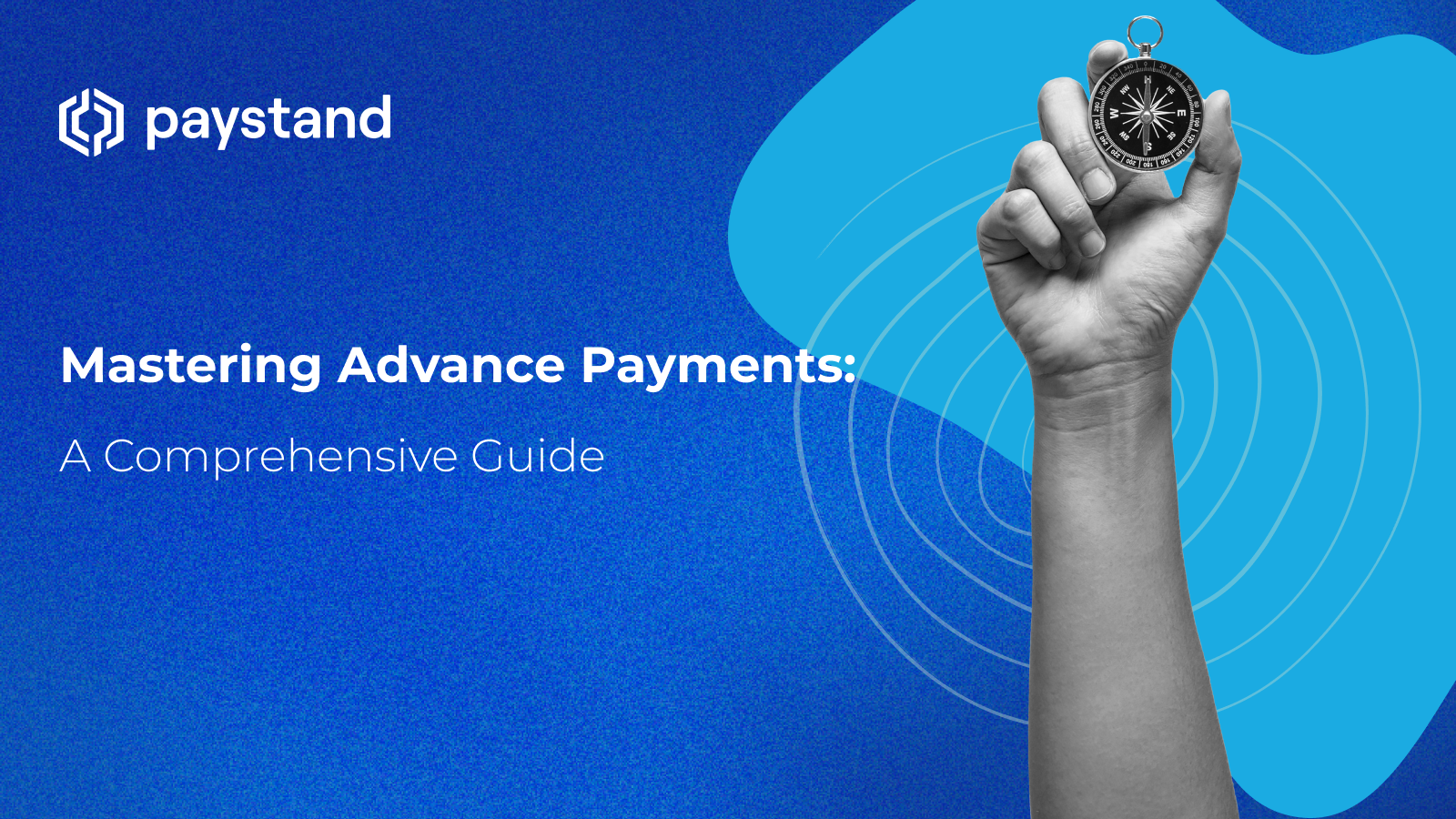Mastering Advance Payments: A Comprehensive Guide

Table of Contents
- What is an Advance Payment?
- What is Advance Bill Payment?
- How to Treat Advance Payments in Accounting?
- Advance Payment Methods
- Advance Payments Advantages and Disadvantages
- Streamline Advance Payments with Paystand
Key Takeaways
- Advance payments are made before the normal schedule to secure products or services, act as deposits, or demonstrate commitment.
- In B2B settings, they help with cash flow management, risk mitigation, and trust-building.
- In accounting, they are initially recorded as current assets and reclassified as expenses upon transaction completion.
- Advance payment advantages include securing financing, predictable cash flow, and building trust, while disadvantages include tying up cash flow, potential liabilities, and tax obligations.
Advance payments are critical in B2B transactions, often as a financial lifeline ensuring smooth operations and fostering trust between business partners. Understanding them can significantly impact a company's financial health, whether it's to secure a product, guarantee a service, or simply maintain a steady cash flow.
But how exactly do these payments work, and what do they mean for accounts receivable management and cash velocity?
In this comprehensive guide, we'll demystify advance payments, exploring everything from their definition and accounting treatment to the methods used and their importance in business. Mastering them can enhance cash flow and improve accounts receivable management. Ready to elevate your financial strategy? Let's dive in.
What is an Advance Payment?
An advance payment is a type of payment made ahead of its normal schedule. This can occur for various reasons, such as securing a product or service, depositing, or ensuring commitment. In B2B payments, they are often used to manage cash flow, mitigate risk, and build trust between business partners.
Advance payments can occur for various reasons, including:
- Securing a product or service: Often used to reserve a spot for products or services, particularly in high demand or with limited availability. This can help ensure the buyer receives the desired product or service on time and without delay.
- Deposit: Common in hospitality, travel, and events to secure reservations, they guarantee commitment and contribute to the final payment.
- Ensuring commitment: Show a buyer's responsibility, building trust and meeting obligations.
In B2B payments, advance payments are often used for several additional reasons:
- Cash flow management: By receiving payment in advance, businesses can better understand their financial situation and plan for future expenses.
- Mitigating risk: Ensure funds to cover goods or services costs before delivery. This can be particularly important for businesses that operate on thin margins or have high upfront costs.
- Building trust: Advance payments can help build trust between business partners by demonstrating a commitment to the agreement and a willingness to invest in the relationship.
What is Advance Bill Payment?
Advance bill payment refers to paying a bill before the due date. This practice can help businesses manage their accounts receivable efficiently and improve cash velocity. By making advance bill payments, companies can avoid late fees, take advantage of early payment discounts, and maintain a good credit standing with suppliers.
How to Treat Advance Payments in Accounting?
In accounting, advance payments are treated as current assets on the balance sheet until the goods or services are received. Once the transaction is completed, the payment is reclassified as an expense.
- Record the Payment: Debit the advance payments account and credit the cash/bank account.
- Receive the Goods/Services: Debit the relevant expense or asset account and credit the advance payments account.
Proper advance payment management is crucial for accurate accounts receivable management and healthy cash flow.
When a company receives an advance payment, it must record the transaction in its accounting records. The company will debit an asset account, such as "Cash" or "Accounts Receivable," and credit a liability account, such as "Unearned Revenue" or "Deferred Revenue."
The unearned revenue account represents the company's obligation to provide the goods or services paid for in advance. As the company earns revenue, it debits the unearned revenue account and credits the revenue account.
Tax Implications
Advance payments can have tax implications for both the company and the customer. The company may be required to pay taxes on them, even if it has not yet earned the revenue. The customer may be able to deduct the advance payment on their taxes if they itemize their deductions.
Advance Payment Methods
The advance payment method involves the buyer paying a portion or the entire amount before the delivery of goods or services. This method is commonly used in international trade, large transactions, and custom orders. It helps sellers secure funds and ensure buyers receive the agreed-upon goods or services. Common methods include:
- Bank transfers: Direct funds transfer from the buyer's to the seller's account.
- Credit/debit cards: Using cards for secure and traceable payments.
- Credit letters: A guarantee from the buyer’s bank ensuring the payment to the seller upon fulfilling certain conditions.
Advance Payments Advantages and Disadvantages
There are several advantages and disadvantages to using advance payments.
| Advantages | Disadvantages |
|---|---|
| • Business projects secure financing | • Cash flow tie-ups |
| • More predictable cash flow | • Liability in providing goods and services paid in advance |
| • Trust-building between businesses and customers | • Can be subject to taxes |
Streamline Advance Payments with Paystand
Understanding and effectively managing advance payments is crucial for maintaining a healthy cash flow and ensuring robust accounts receivable management. By integrating best practices and leveraging the right tools, businesses can optimize their financial operations and foster stronger relationships with partners.
Paystand offers innovative B2B payment solutions that streamline the process, enhance cash velocity, and provide greater financial transparency. Explore how we can transform your payment processes and drive your business forward by learning about our B2B payment solutions today.





